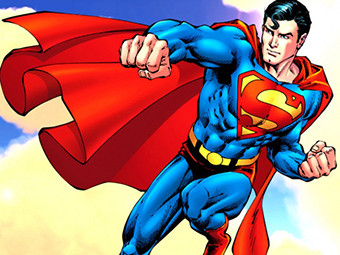Mensch of Steel
Permanent link All Posts
You might be wondering what the most Jewish movie of the summer is this year. Is it the annual Woody Allen flick (Blue Jasmine)? Is it Grown Ups 2 (thanks again, Adam Sandler…)? No, it's Man of Steel.
If you don't know what's Jewish about Superman, first, shame on you, and second, I apologize for that, I didn't mean it (mostly). Please allow me to explain.
The piece that you should already be at least vaguely aware of is that Superman was created by two nice Jewish boys, Jerry Siegel and Joe Shuster, sons of Jewish immigrants who met when they were in high school in Cleveland circa 1930. It is widely asserted that their upbringing and Jewish roots had influences on their creation of the Superman character.
Like his creators, Superman is very much an immigrant (coming from another planet and all), and unlike many of the heroes that followed him in the comic world, he is one of few who makes an effort to assimilate, donning the "disguise" of Clark Kent. In a way, he's almost desperate to fit in, and that was a significant element of American Jewish life at the time.
Many have pointed out that Superman's story of immigration—which involves his parents packing him into a tiny space vessel to save him from destruction and sending him to Earth—directly reflects the story of baby Moses in the basket, who as we all know, grew to become a prophet to the Jewish people and led them to the most crucial points of their destiny.
Speaking of prophets, Superman is the last son of Krypton and a member of the House of El. "El," of course, is Hebrew for "God," and Superman's Kryptonian name is Kal-El, which when written in Hebrew resembles the words for "voice of God." Many prophet and angel names end in "El," (Gabriel, Ezekiel, Uriel, etc.) and in many ways the Superman character is a prophet or angel to the people of Earth.
As it applies to the creation of the character, all this is theory, but we do know that Siegel has openly stated that the biblical character Samson was an influence on Superman. Samson boasted incredible strength and only one physical weakness: his hair was his Kryptonite.
But regardless of how directly influential Judaism was on Superman's creation, our tradition—especially the stories—definitely laid the foundation for the world's first great comic book hero.
On the other hand, there's the somewhat troubling connection of Superman being translated to Ubermensch, the term coined by Friedrich Nietzsche and adopted by Adolf Hitler and the Nazis: a perfect man who transcends society, religion and morality and is beyond moral codes. The character was obviously born at a time when there was enough awareness of the Nazi Party, so one has to consider Siegel and Shuster didn't do this coincidentally. Yet we know Superman to be a hero who holds himself to moral codes; in a sense, he chooses not to be the Ubermensch in doing so. The Yiddish word mensch, meaning someone of great character and integrity, therefore seems more fitting. The most logical explanation for this irony is that Superman actually received his name when he was depicted as a villain bent on world domination in a short story featured in a fanzine Siegel published in 1933. The character was likely meant to vilify Hitler if anything.
Of course, Man of Steel is just the latest in a long line of Superman iterations. The character has evolved well beyond the intentions of Siegel and Shuster, so whatever makes it Jewish at this point is nothing more than coincidence.
Well, kinda. It all goes back to Superman's all-important origin—baby Moses in the spaceship. This story is what informs the soul of the character, and there's no question that's where "Man of Steel" wishes to go when you consider Christopher Nolan (The Dark Knight Trilogy) oversaw the project and the formation of the story and brought along The Dark Knight writer David S. Goyer for the script.
This film draws out Superman's (Henry Cavill) origin substantially, showing not only scenes of Clark Kent living in Smallville, Kan., but also in Alaska, hiding from his powers. We know he will ultimately be called to the Fortress of Solitude by his birth father (Russell Crowe) and be faced with the choice to become Superman, fulfilling his destiny and serving as a lasting beacon of hope for humanity.
If that's even remotely close to the film's plot, then this "new" Superman is even more like Moses than Siegel and Shuster ever imagined him.
When Moses saw a taskmaster beating a slave, he killed the taskmaster, enraged by the injustice. Fearing for his life, he fled Egypt and lived as a shepherd in Midian for 40 years. Finally, he was called by the burning bush and heard the voice of God calling him into action and his destiny.
When Superman dons the red cape and the emblazoned "S" (which as the "Man of Steel" trailer tells us is a Kryptonian symbol for "hope"), he agrees to hold himself to a higher moral code and take on great responsibility, much as Moses chose to act as a prophet of God and assume a leadership role in leading the Israelites to their hope—the land of Israel.
So while plenty of issues of Superman comics have made it clear that the Man of Steel was a Methodist, he wasn't exactly born that way, so to speak. But even if you're of the camp that creators don't intentionally bury certain references and influences into their work, you have to marvel at the universality of the themes and ideas buried in the stories of our tradition thousands of years ago.
Man of Steel is in theaters this Friday, June 14.



.jpg)



